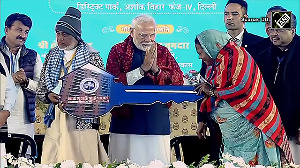The BJP leadership is understandably mulling all options on the roll-out of the GST, says A K Bhattacharya.

An analysis carried in Business Standard about the states that have already ratified the Constitution Amendment Bill on Goods and Services Tax (GST) provides revealing insights into the political possibilities that can arise out of the proposed indirect taxes regime.
It also brings out with great clarity the nature of the tough political resistance the new law and its enforcement could face.
Of the 18 states that have endorsed the GST Bill, 10 are ruled by the Bharatiya Janata Party (BJP) and its allies. This is not a surprise.
After all, the GST proposal in its current form has been spearheaded by the BJP-led government at the Centre.
What, however, is a surprise is the fact that so far the expected ratification has not come from quite a few of the states, ruled either by a BJP-led alliance or those parties that had supported the Constitution Amendment Bill in Parliament.
For instance, the Trinamool Congress-led West Bengal had initially planned to ratify the GST Bill at a special Assembly session, but it was dropped from the agenda at the last moment.
Andhra Pradesh is another state, where the government led by the Telugu Desam Party, despite its proximity to the BJP, is reluctant to ratify the Bill for fear of revenue loss.
The Jammu and Kashmir government is led by a coalition of the BJP and the Peoples Democratic Party.
Granted that the state is experiencing turmoil for several weeks and its Assembly passing the GST Bill is materially insignificant as it would not be enforcing the new tax regime as a result of its enjoying special status.
But its failure to endorse the Bill could be construed as a political signal not healthy for the GST’s national acceptance and compliance.
Similarly, Punjab’s failure to ratify the GST Bill may raise uncomfortable questions on whether the BJP’s political leadership has tied up all the loose ends on as crucial an issue as the GST.
The resistance from the Tamil Nadu Assembly to endorse the GST Amendment Bill is understandable as the All India Anna Dravida Munnetra Kazhagam has made its opposition to the idea quite open.
But more puzzling is the role of several Congress-led states, as at least six of them have not endorsed the Constitution Amendment Bill on GST, because the Congress high command in New Delhi is yet to give them the green signal.
To be sure, three Congress-led states have ratified the GST Bill - two of them are from the Northeast and one is a hill state.
And as long as half the state Assemblies ratify the GST Bill, the Union government can move ahead with the follow-up legislative agenda.
But that is not what may be worrying the BJP leadership.
It is now being goaded by triumphant voices that are asking the Centre to bring in the remaining GST laws at the earliest without waiting for other states to send in their ratification.
But the dilemma for the Centre is: Should the government go ahead and run the risk of offending some of the political parties that had supported the Constitution Amendment Bill in Parliament but have not endorsed it by now?
Commentators have noted that the idea of GST is progressive economic reform but it is also a great political risk.
Examples of what happened to the Vajpayee government after it had championed privatisation and the roll-out of the state-level value-added tax system are being cited in this context. Surely, neither of the moves had yielded any political dividend for the Atal Bihari Vajpayee government.
Now that the Narendra Modi government is pushing ahead with some tough reforms and is keen on launching the GST, it is debating if waiting for other states to endorse the Constitution Amendment Bill on GST would be prudent and could safeguard the government against potentially trouble-making and disruptive politics from some parties such as the Congress.
The bitter memory of what happened to its move to change the land acquisition law is still fresh and the BJP leadership is understandably mulling all options on the roll-out of the GST.
That approach is not imprudent. Going ahead with the GST law, even when several important states like West Bengal and Uttar Pradesh are yet to ratify the Constitution Amendment Bill on GST, might in particular upset the two parties ruling these states - the Trinamool Congress and the Samajwadi Party. Why upset them and allow a build-up of political opposition to the GST at this stage?
GST is an indirect tax and unlike a direct tax, it could well be rolled out anytime in the course of the next financial year.
Photograph: Reuters











 © 2025 Rediff.com -
© 2025 Rediff.com -